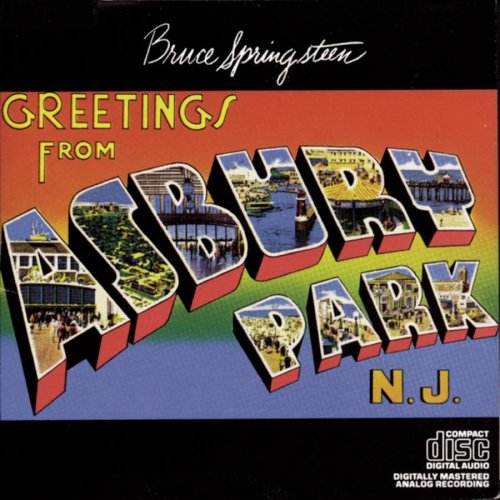Now, that doesn't mean I'd given up on The Boss, no sir. I fully expect, when the time comes to really start working on melody and lyric lines, I'll be bringing my Springsteen influence back to bear.
However, over the weekend I was watching my new London Calling: Live in Hyde Park Blu-Ray, and I was sucked back into the orbit. So, I hatched this idea, I'm going to write about each Springsteen album, in order, on Mondays. I may miss a few Mondays, here and there. I have vacations and such coming up, but I will get through all 16 studio albums, sooner or later.
I'm still not sure about live disks. It may end up being too much. If I do them, it'll be after the studio records.
First out, is Greetings From Asbury Park, New Jersey. Originally released January 5th, 1973.

Now, I suppose it ought to be said that I think Springsteen is a genius, so when I criticize something he does, it is only in relation to his other work. When I say a song is "weak," read that only in that most of the rest of the catalog is stronger. You're rarely going to hear me say something he does "sucks."
Greetings is a first album, it's practically written all over it. The credited producers are then-Springsteen Manager Mike Appel and Jim Cretecos. There was some tension behind the scenes in that John Hammond singed Bruce to Columbia Records with the intention of gaining a new Folk act like Dylan.
Of course, Springsteen had other ideas, a full-band rock sound. Then, after Hammond heard the finished album, he indicated more "singles" were needed. This prompted the addition of "Blinded By the Light" and "Spirit in the Night," which also happen to be the only two tracks on which saxophonist and E-Street Band mainstay Clarence Clemons plays.
Generally, the album sounds like an artist finding his voice. The Dylan influence is extremely clear, and it can overwhelm the unique voice that Springsteen would find, and perfect on subsequent albums. The simple addition of the Sax on the aforementioned tracks makes a world of difference, as it gells what would become the clear E-Street sound, even if the ultimate, time-honored version of the band wouldn't arrive for two more records.
The Springsteen word-play is almost out of control on this album, and sometimes it gets in the way. He hadn't yet found the sweet spot between evocative language and big emotional ideas.
Greetings feels more about details than emotions. The words dazzle, the songs are never less than entertaining, but it doesn't have the pointed emotional impact you'll find on subsequent projects. The HUGE exceptions, for me, is "Growin' Up," which is, probably, my favorite Springsteen song, ever. That, and "Lost in the Flood," which feels like a song that leapt forward in time from the Born to Run sessions.
The two added hits, "Blinded By the Light" and "Spirits in the Night," contain at spirit and freewheeling energy that leads me o think Bruce does well when he's asked to create something for a specific purpose. They both have a drive that compliments the swirling lyrics. Not to mention a fantastic riff/hook on "Spirits."
"Mary, Queen of Arkansas" is much-maligned, and, frankly, I don't get it. The music is a little bogged down, but the lyrics do evoke a specific person and situation rather effectively. "Does this Bus Stop at 82nd Street?" is also good fun, propulsive and urgent. "For You" pre-dates "Dancing in the Dark" for Springsteen's ability to take a rather dark lyric, and wrap it in an upbeat tune. "The Angel" and "It's Hard to be a Saint in the City" both show Springsteen's eye for detail was sharp from day one.
It's a lovely set of songs, without a doubt. The only weakness is that, compared to later work, Bruce had not yet learned how to powefully hook into the basic, universal emotions he would so richly display mere months later. He was learning, but watching such a talented musician learn can be just as enthralling.
Hey Mark, nice touch on the new Mondy theme. Keep them up.
ReplyDelete